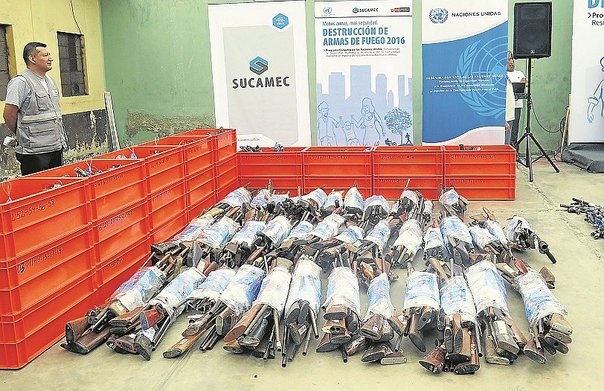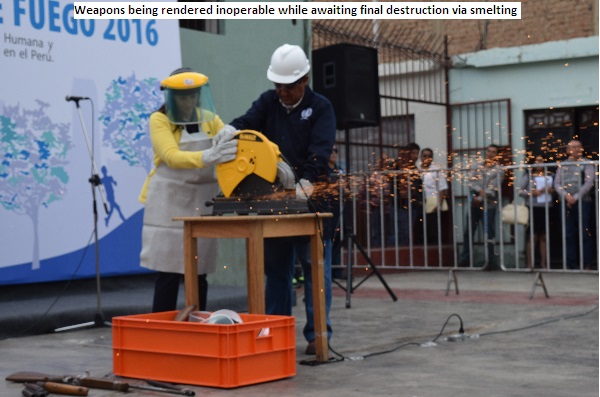Jul 13, 2016 | Uncategorized
The United Nations Regional Centre for Peace, Disarmament and Development in Latin America and the Caribbean (UNLIREC) participated in a session of the Human Security Course: A Comprehensive Approach for Reducing Violence in the City of Trujillo on 13 July 2016. This course was organized by the United Nations Joint Programme entitled aimed at strengthening human security and community resilience by fostering peaceful co-existence in Peru. The Course targeted university students, professionals and local authorities.
UNLIREC, as a member of the Joint Programme for Human Security, participated as speaker during the session on firearms and its impact on human security. UNLIREC experts highlighted the problems related to illicit arms and ammunition trafficking in the region, the impact of armed violence, as well as public measures and policies for arms control.
Testimonial videos of the victims of armed violence were presented in order to stress the human impact of this kind of violence. The participants shared their own points of view regarding the presence and circulation of weapons in society, and they agreed that the use of firearms is a multidimensional problem that necessitates a multisectoral response.
The United Nations Joint Programme on Human Security, to which UNLIREC forms part, works in collaboration with public institutions and local authorities of Trujillo to reduce and prevent crime in general, gender-based violence and youth involvement in criminality.
Jul 11, 2016 | Uncategorized
From 7 to 11 November 2016, the United Nations Regional Centre for Peace, Disarmament and Development in Latin America and the Caribbean (UNLIREC) carried out a mission in El Salvador to advance towards the implementation of the activities that form part of the project entitled: Strengthening Oversight and Building capacities for Small Arms Control and Nonproliferation in the Private Security Sector.
Since July 2015, UNLIREC, in collaboration with the Geneva Centre for the Democratic Control of Armed Forces (DCAF), provides technical assistance to the governmental authorities and to the private security sector in El Salvador to promote the regulation and arms control of the private security sector.
During the mission, UNLIREC and DCAF held meetings with various national authorities about the legal-technical support that the project can offer to reform processes to the private security Law. Furthermore, DCAF presented the International Code of Conduct for Private Security Service Providers (ICoCA) to several private security companies in order to share the scope and benefits of this initiative. The ICoCA compiles internationally recognized standards and good practices to ensure the good management and governance of the private security companies that voluntarily adhere to the Code.
Likewise, during its visit to El Salvador, UNLIREC team diagnosed the level of compliance of the International Small Arms Control Standards (ISACS) and International Ammunition Technical Guidelines (IATGs) in several security companies. Recommendations were made to increase the level of compliance through these guidelines aimed at improving the security of companies to prevent theft, as well as the diversion of weapons and ammunition to illegal actors.
Finally, UNLIREC carried out a two-day technical workshop on international standards for weapons and ammunition stockpile management. This is the second workshop that UNLIREC carries out in this country, addressed to operational staff of the companies providing security services. Participants received a training aimed to incorporate the physical security procedures in their weapons and ammunition stockpiles to minimize risks of weapons diversion into illegality.
This project is funded by the Federal Republic of Germany. Through this assistance, UNLIREC supports Latin America and Caribbean States in the implementation of the UN Programme of Action to Prevent, Combat and Eradicate the Illicit Trade in Small Arms and Light Weapons in All Its Aspects (UN 2001 PoA).

Jul 7, 2016 | Uncategorized
The United Nations Regional Centre for Peace, Disarmament and Development in Latin America and the Caribbean (UNLIREC) supported the largest destruction of firearms in the history of Peru. The National Regulatory Entity for Security Service, Firearms, Ammunition and Explosives for Civilian Use (SUCAMEC) undertook the destruction of nearly ten thousand firearms in the steel company SiderPeru on 7 July 2016. UNLIREC provided technical assistance and accompaniment to this activity, which took place within the framework of the global initiative that commemorates International Gun Destruction Day on 9 July by the United Nations.
The UN, with years of accumulated experience in combating illicit arms trafficking, has concluded that the periodic destruction of weapons is the most effective way to ensure that weapons do not return to illegality and are not used to put innocent lives and the security of communities at risk. Destruction is irreversible and thus clearly contributes to the prevention and reduction of armed violence and therefore the strengthening of citizen security. In carrying out weapons destruction processes, the state sends a clear message to its citizens about its commitment to arms control.
After an exhaustive process of documentation, monitoring and verification, weapons were destroyed by smelting in the Sider Perú industrial complex in the city of Chimbote. UNLIREC accompanied the process and ensured that international arms control standards were applied in accordance with international commitments made by Peru.
Among the destroyed weapons were revolvers, pistols, shotguns, rifles and craft weapons from different regions of the country. The majority of the destroyed weapons had been seized by the Peruvian National Police in various unlawful acts and all judicial proceedings had been concluded.
Since 2002, UNLIREC has supported the Government of Peru in various weapons destruction processes and has provided transparency and technical assistance to these activities.
Source: UNLIREC
Jun 27, 2016 | Uncategorized
Tackling proliferation financing has become a new priority for many countries seeking to address the proliferation of weapons of mass destruction (WMD). In many jurisdictions, existing laws that address money laundering and the financing of terrorism are being examined and extended to criminalize proliferation financing specifically.
Implementation of specific laws to address the financial aspects of counter-proliferation provides countries with the opportunity to tailor legislation that simultaneously addresses compliance with international obligations and recommendations. Most notably with UN Security Council resolution (UNSCR 1540), Financial Action Task Force (FATF) Recommendations; and various UNSCRs on DPRK and Iran.
Within this context, the United Nations Regional Centre for Peace, Disarmament and Development in Latin America and the Caribbean (UNLIREC) drafted Guidelines and Recommendations on Preventing Proliferation Financing, which draws together all of the above mentioned international instruments dealing with the prevention of proliferation financing and applies them to the jurisdiction of Trinidad and Tobago. On 27-28 June 2016, representatives from UNLIREC travelled to Trinidad and Tobago to present the Guidelines in a workshop that brought together experts on UNSCR1540, UN targeted sanctions, FATF recommendations, as well as experts to discuss operational practicalities concerning the regulation of proliferation financing.
The workshop in Trinidad and Tobago was the first regional event to focus on combatting proliferation financing. The reality of proliferation financing is that it costs money to manufacture, acquire, develop, export, transship, broker, transport, transfer and stockpile nuclear, chemical or biological weapons. It is therefore a key aspect linked to the detection and interdiction of proliferation attempts. Assisting countries to strengthen their legislative frameworks to regulate financial service and provision of funds for these activities is an important contribution to global counter-proliferation efforts.
Trinidad and Tobago is the first Caribbean country to intensify efforts relating to the prevention of proliferation financing. UNLIREC looks forward to working with Trinidad and Tobago as legal drafting progresses in relation to this important aspect of counter-proliferation.
Jun 27, 2016 | Uncategorized
From 26 June to 1 July 2016, the United Nations Regional Centre for Peace, Disarmament and Development in Latin America and the Caribbean (UNLIREC), in collaboration with the government of Trinidad and Tobago, carried out a three-day training course, a technical assessment of national capabilities and infrastructures, and a seminar for the institutional clients of firearms forensic ballistics in Port of Spain. These clients included officials from the Trinidad and Tobago Police Service, members of the Judiciary, prosecutors, among others.
The three-day training course on operational forensic ballistics enabled 12 participants, including firearms examiners, armourers and technicians to increase their knowledge on topics, such as firearms and ammunition identification and examination, comparison microscopy, range of fire determination. The course included a simulation of the presentation of expert testimony of forensic ballistic evidence in a court of law and provided the opportunity for participants to exchange best practices and challenges faced in the field.
The national assessment, carried out in cooperation with the Trinidad and Tobago Forensic Science Centre took into consideration the occupational health and safety of the firearms examiners (e.g. lead contamination), adequate protective equipment, firearms safety protocols, evidence management, as well as the continuing education plans for firearm examiners and other law enforcement personnel. The main recommendations of the assessment will be integrated in the two year capacity-building work plan for forensic ballistics.
The seminar raised the awareness of 24 institutional clients of firearms forensic ballistics on the strengths and shortcomings of forensic ballistics in support of building court cases, as well as in generating intelligence to identify sources and routes used for illicit arms trafficking. In addition, UNLIREC staff provided a review of best practices in forensic ballistics analysis and investigative techniques.
This initiative is part of the UNLIREC Caribbean Operational Forensic Ballistics Assistance Package, which is made possible thanks to the support of the US Department of State.
UNLIREC, as the regional organ of the UN Office for Disarmament, seeks to advance the cause of practical disarmament in Latin America and the Caribbean as part of its commitment to support Member States in their implementation of international disarmament and non-proliferation instruments, in particular, the 2001 UN Programme of Action on Small Arms.

Jun 7, 2016 | Uncategorized
The United Nations Regional Centre for Peace, Disarmament and Development in Latin America and the Caribbean (UNLIREC), within the framework of the United Nations Joint Programme entitled “Strengthening Human Security and Community Resilience by Fostering the Promotion of Peaceful Coexistence in Peru”, participated in the verification and monitoring process of more than 1,200 firearms. This process was carried out in collaboration with the National Superintendence for the Control of Security Services, Arms, Ammunition and Explosives for Civil Use (SUCAMEC) and concluded, on 6 July, with a public event at the police station in the centre of Trujillo, a northern Peruvian city suffering from elevated levels of armed violence.
This is the second firearms destruction carried out in Trujillo with the technical support of the United Nations, which coincided with the UN International Day of Firearms Destruction being celebrated later that week (9 July). Regional, local, and district authorities attended the ceremony to observe the symbolic cutting of the firearms confiscated by the Peruvian National Police rendering them inoperable until final destruction the next day at a steel company in Chimbote, Peru. The confiscated firearms included revolvers, pistols, shotguns, carbines, homemade weapons and rifles.
UNLIREC participated in the entire destruction process, from the planning stage, training, registration, monitoring, and verification of weapons to the final act of destruction.
Firearms destruction is one of the most effective means of improving citizen security, as it allows States to rid of surplus, obsolete, confiscated weapons or those surrendered by civilians, thus reducing the possibilities of their proliferation and misuse.


